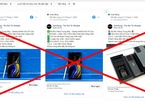 |
|
The draft decree creates a legal corridor to manage cross-border advertising platforms such as Facebook, Google. Photo: Trong Dat
|
The Ministry of Information and Communications is collecting comments on a draft decree to amend and supplement a number of articles of Decree No. 181/2013/ND-CP which was issued in 2013. The new decree will include new details related to the implementation of the Law on Advertising, especially for cross-border advertising activities.
Accordingly, foreign organizations and individuals providing cross-border advertising services in cyberspace that generate revenue or have users in Vietnam must comply with Vietnamese law, including laws on advertising, law on management, provision and use of Internet services and information on the Internet.
Foreign organizations and individuals must inform the Ministry of Information and Communications and this task must be conducted every 12 months or at the extraordinary request of the Department of Radio, Television & Electronic Information under the Ministry of Information and Communications.
Cross-border advertising service providers must pay taxes according to Vietnamese law. They are obliged to inspect and review advertising products to comply with the provisions in Article 8 of the Law on Advertising.
Specifically, violations that will be fined include: advertising banned products, goods and services (guns, weapons, cigarettes, drugs, ...), disclosing state secrets, harming national independence and sovereignty, offending cultural celebrities and national heroes, and the honor, prestige and dignity of organizations and individuals.
The cross-border advertising service providers in Vietnam must also comply with the provisions of Clause 1, Article 8 of the Law on Cyber Security.
Accordingly, these units are not allowed to advertise products with intent to incite, bribe, deceive, entice, and train people against the State of the Socialist Republic of Vietnam, or those containing contents that distort history, have false information, encourage prostitution, social evils, human trafficking, and incite or induce others to commit crimes.
The Decree also requires cross-border advertising service providers to have a solution to ensure that advertisers in Vietnam have the ability to control, detect and remove advertising products that violate the law.
The draft decree not only creates a legal corridor to manage cross-border advertising platforms such as Facebook, Google, but also the operation of traders, publishers and those who want to post ads.
 |
|
|
Accordingly, the advertising service providers on the platforms of cross-border organization are responsible for checking the contents of the advertising products to ensure that these products do not violate the provisions of Article 8 of the Law on Advertising.
These people are also obliged to ask the cross-border platforms to choose ad placement that does not violate the provisions of Article 8 of the Law on Cyber Security.
Publishers of advertisements in Vietnam (eg newspapers, news sites, YouTube, applications, ...) must ensure their ability to detect and remove advertising products provided from cross-border advertising services that break Vietnam’s law.
Advertisement issuers are also not allowed to post or distribute advertising products of organizations and individuals providing cross-border advertising services that have been notified by competent authorities to violate Vietnamese laws.
For people with advertising needs, they will not be allowed to post or broadcast advertising products on advertising platforms that violate the law. These people will also be responsible for advertising products when signing contracts with cross-border platforms and services.
Trong Dat

Facebook, social networks abused by phishing attacks
Social networks, including Facebook, have become the ideal environment for cybercriminals to seek profits by phishing.

Is Facebook refusing to block 'dirty ads' in Vietnam?
Facebook has been accused of not blocking ‘dirty ads’ and lending a hand to the behavior of swindling consumers, thus harming the reputation of e-commerce websites and big brands in Vietnam, according to retailers.